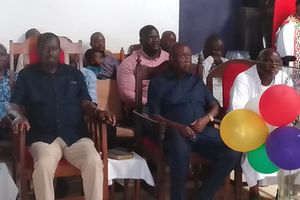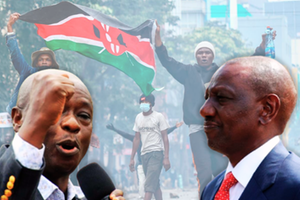Lady Maureen is gone, but her legacy lives on

What you need to know:
- Under Daudi, Lady Maureen came under pressure to do her best because of the rivalry of flamboyant musicians who were also eyeing the genre’s glory.
She moved to Nairobi after the 2007 General Election to seek a new fan base, Kisumu having been dominated by male artistes.
In mid 2004, a young woman stormed the Kisumu Social Centre — then popular with ohangla music — eager to have a piece of the action.
She wanted to be incorporated into singing, which appeared a tall order in a predominantly male domain, with ohangla music at the time discarding traditional instruments for modern ones.
The newcomer was Maureen Achieng’, who came to be known by her stage name, Lady Maureen, until her death last Saturday. She persuaded David Ochieng’, better known as Daudi Jamigori, to let her join Nyamollo Traditional Band, then highly popular in the lake region.
Daudi welcomed her, albeit hesitantly, until Lady Maureen went on stage after months with the band. Her husky yet persuasive voice became an instant crowd puller to the genre, which was thought to be outdated and belonged to the village.
UNDER PRESSURE
Under Daudi, Lady Maureen came under pressure to do her best because of the rivalry of flamboyant musicians who were also eyeing the genre’s glory. They were Ouma Basement, Ken Wuod Alego, Onyango Jakadenge, Ochieng’ Wuod Ojolla and Onyango Papa Jey.
In an interview with the Nation on Sunday, Daudi — who has since retired from active music — revealed that Maureen participated in Nyamollo Band’s album titled Kisumo Obarore (Kisumu is Split) in 2005, before starting her own music outfit in 2006, which performed at Ofafa Memorial Hall in Kisumu.
“The first time I heard her sing. I knew she had great talent because male musicians were envious of her crowd-pulling antics,” said Daudi.
Her first songs were Okecha, Wach Love and Amollo Tinga, recorded in 2005. After the failed referendum that created the Orange Democratic Movement, she released Wang’ni Wabiro (We are coming this time). The songs did quite well, because of the rising political temperatures.
She moved to Nairobi after the 2007 General Election to seek a new fan base, Kisumu having been dominated by male artistes.
Kisumu-based Benga musician Linet Aluoch Pamba yesterday told the Nation that Lady Maureen performed tirelessly, until she started ailing.
“I spoke to her last month, when her grandmother took her for a medical check-up in Kericho from Pap Onditi, Nyakach, in Kisumu County,” she said.
SUPPORT MUSICIANS
Linet, who heads the Kisumu-based Karapul Jazz Band, first met Lady Maureen in 2006 while she (Linet) was still with the legendary DO Owino Misiani’s DO 7 Shirati Jazz.
“Maureen was outstanding in anything she did, having excelled as one of the pioneer ohangla women musicians,” Linet said, adding that fans should support musicians as they go through the highs and lows in their careers.
Linet, who appears on the Luo Benga Live TV shows online, is among the few surviving female Benga stars. Others, Okinyo Black Currant and Grace Nyakindu, are Ohangla stars. Ahead of the 2013 General Election, she rose to national fame when her two songs, Raila Agwambo and On’geche Manigole Bungu (The monkeys you rescued), became campaign hits for the Opposition.
Ohangla musician Joseph Ochieng’, who is famous for her song Raila Tibim, says singing about Mr Odinga is an instant crowd puller.





